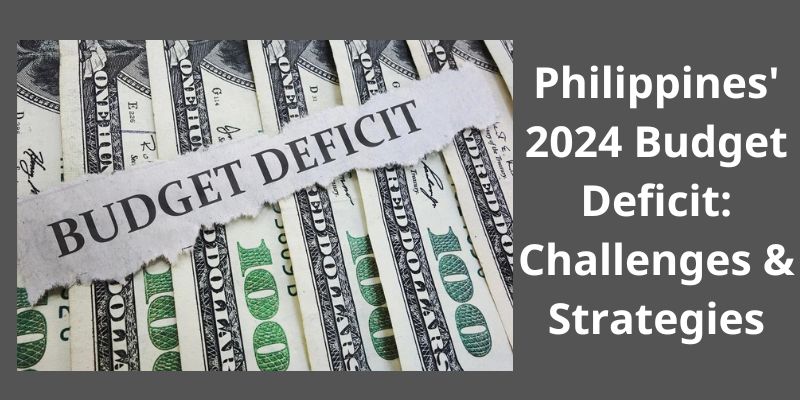The Philippines has faced significant fiscal challenges in 2024, with the budget deficit widening to unprecedented levels. The government’s fiscal position has been under scrutiny as it navigates the complexities of managing public finances amidst economic uncertainties. This article delves into the factors contributing to the budget deficit, the government’s response, and the implications for the country’s economic future.
How the Government is Addressing the Budget Deficit
The budget deficit in the Philippines has been primarily driven by a combination of increased government spending and lower-than-expected revenue collections. In November 2024, the government posted a budget deficit of PHP 213 billion, more than double the deficit recorded in the same month the previous year. This increase was largely due to higher capital expenditures for infrastructure projects, social protection programs, personnel services requirements, and interest payments on the national debt.
The ongoing recovery from the COVID-19 pandemic has also placed additional pressure on public finances. The government has had to allocate substantial resources to healthcare, vaccination programs, and economic stimulus packages to support affected businesses and individuals. These necessary expenditures have significantly increased the fiscal burden.
On the revenue side, collections from non-tax sources saw a significant decline, primarily due to lower remittances from the Bangko Sentral ng Pilipinas. While tax collections increased, they were not enough to offset the surge in government spending. The Bureau of Internal Revenue (BIR) and the Bureau of Customs (BOC) reported higher collections, but these gains were overshadowed by the overall increase in expenditures. Additionally, the slowdown in global trade and economic activity has impacted customs duties and other revenue streams.
Government’s Response to the Budget Deficit
To address the widening budget deficit, the Philippine government has implemented several measures aimed at boosting revenue and controlling expenditures. One of the key strategies has been the introduction of new tax measures, including an excise tax on sweet drinks and junk food, as well as a value-added tax (VAT) on digital services. These measures are expected to generate additional revenue and help narrow the budget gap.
The government has also focused on improving tax collection efficiency through digitalization and stricter enforcement. The Department of Finance (DOF) has also increased the dividend rates for government-owned and -controlled corporations (GOCCs) to 75% from 50%, resulting in higher non-tax revenues. Furthermore, the government is exploring public-private partnerships (PPPs) to finance infrastructure projects and reduce the fiscal burden.
On the expenditure side, the government has implemented austerity measures to control spending. These measures include prioritizing essential projects, reducing non-essential expenses, and improving budgetary oversight. Additionally, the government has emphasized the need for efficient and transparent use of public funds to ensure that expenditures contribute to economic recovery and development.
Implications for the Economy
The budget deficit has significant implications for the Philippine economy. Higher deficits typically lead to increased borrowing, which can result in higher interest rates and borrowing costs. This, in turn, can crowd out private investment and slow down economic growth. The government’s fiscal deficit for 2024 is projected to be PHP 1.36 trillion, or 5.1% of GDP, which is higher than the previous year’s deficit.
Despite these challenges, the government remains optimistic about the country’s economic prospects. The 2024 budget includes provisions for infrastructure development, social protection programs, and other initiatives aimed at fostering economic growth and reducing poverty. The government’s commitment to infrastructure development is expected to create jobs, improve productivity, and stimulate economic activity.
To manage the fiscal deficit, the government is also working on enhancing public debt management strategies. This includes diversifying funding sources, extending debt maturities, and reducing the cost of borrowing. By maintaining fiscal discipline and implementing prudent debt management practices, the government aims to ensure fiscal sustainability and maintain investor confidence.
The success of these measures will depend on the government’s ability to implement them effectively and sustain economic growth. The private sector’s role in economic recovery is also crucial. By fostering a business-friendly environment, encouraging investments, and promoting innovation, the government can create a conducive atmosphere for private sector growth and economic development.
Conclusion
The budget deficit of the Philippines in 2024 presents both challenges and opportunities for the government. While the deficit has widened due to increased spending and lower revenue collections, the government’s proactive measures to boost revenue and control expenditures are expected to mitigate the impact. The success of these measures will depend on the government’s ability to implement them effectively and sustain economic growth.
As the Philippines continues to navigate its fiscal challenges, it will be crucial for the government to maintain fiscal discipline and pursue policies that promote sustainable economic development. The coming years will be a test of the government’s fiscal management and its commitment to ensuring a stable and prosperous future for the country.
Looking Ahead
Looking ahead, the Philippines must focus on diversifying its economy to reduce its dependence on traditional revenue sources. Investing in emerging industries, promoting technological innovation, and supporting small and medium-sized enterprises (SMEs) can create new revenue streams and enhance economic resilience. Additionally, the government should continue to strengthen its tax administration and enforcement efforts to improve revenue collection.
International cooperation and partnerships will also play a vital role in addressing the budget deficit. By engaging with international financial institutions, seeking technical assistance, and leveraging foreign investments, the Philippines can access resources and expertise to support its fiscal consolidation efforts.
Furthermore, the government should prioritize social protection and inclusive growth to ensure that the benefits of economic recovery are widely shared. By investing in education, healthcare, and social welfare programs, the government can enhance human capital development and reduce poverty and inequality.
In conclusion, the budget deficit of the Philippines in 2024 underscores the need for comprehensive and sustained fiscal reforms. By implementing prudent fiscal policies, promoting economic diversification, and fostering international cooperation, the government can navigate the challenges and create a foundation for long-term economic stability and prosperity. The journey ahead will require commitment, innovation, and collaboration, but with the right strategies in place, the Philippines can achieve its fiscal and economic goals.


Để lại một bình luận